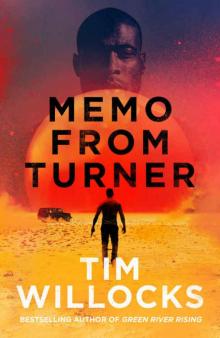- Home
- Tim Willocks
Memo From Turner Page 6
Memo From Turner Read online
Page 6
‘I’m not following you,’ said Venter.
‘The autopsy on the girl will be grim reading.’
‘Aren’t they all?’
‘Let me put it this way, even I’ll find it grim. Here, look at this.’
Turner opened a folder and took out an enlarged A4 print of a group portrait: five white men posed in front of two gleaming SUVs. The photo had been taken at night. The flash gave it an ugly, paparazzi clarity. Turner pointed to each of the four smiling youths in turn.
‘Look at their faces. These are decent people. Privileged people. They have no experience of horror. They feel pity. They feel guilt.’
Turner displayed a second photo, a close-up of a young man raising a shot glass.
‘I believe he’s the driver. With an autopsy sheet I can show him how much pain he dropped on the girl.’
‘Whereupon he’ll confess,’ said Venter.
‘It can only improve the odds.’
Venter trusted Turner’s instincts in such matters. He took a swallow of iced tea. ‘Who is he?’
‘Dirk Le Roux. Last Monday he passed his bar exam, in Pretoria.’
The case began to offer a little more interest than the usual tales of mindless human bestiality.
Venter said, ‘Culpable homicide isn’t the brightest career move.’
‘Dirk invited his home-town pals for a weekend in the big city, to celebrate,’ continued Turner. ‘His farewell to the troops. He bought them tickets to the rugby match. It’s all on Facebook. By one o’clock this morning he’s too drunk to think straight, gets in his car, and shatters the girl’s pelvis like a poppadom. He might not even know he hit her.’
Turner pointed to an older, bearded man at the back of the group.
‘But he knew.’
Venter studied the face. ‘I don’t see a bleeding heart there.’
‘Lionel “Hennie” Hendricks, Dirk’s stepfather. British. A former mercenary. He decided to leave the scene while the girl was still alive.’
‘How do you know?’
‘He’s the boss man.’ Turner produced a printout of a magazine article and handed it over. ‘Dirk’s mother, Margot. From Business Times Africa, last April.’
The title read ‘Le Roux Manganese rejects Chinese takeover bid’.
Above the text was a photo of an imposing woman who didn’t feel the need to smile. Classical but flinty good looks, which appeared to be unimportant to her. Clearly not a bloodsucker. The kind of woman Venter should have married, though he doubted such a woman would have accepted him. The caption identified her as Margot Le Roux. Venter scanned the article. He felt the case dig its hooks into his guts.
‘The bid she rejected was concealed,’ said Turner, ‘but industry sources estimate it couldn’t have been less than seventy million US dollars.’
‘Manganese?’ said Venter.
‘It’s an essential ingredient in the manufacture of steel and aluminium alloys. You can’t make a car or a battery or a Coke can without it. Margot’s sitting on half a billion tons of ore.’
‘Can I keep this?’
‘I’ve got copies.’
Venter put the article aside for later.
‘Here’s a headline for you,’ said Turner. ‘“Manganese Millionaire Kills Township Street Girl”.’
‘You read the tabloids.’
‘It would make the Guardian and the New York Times, too.’
Venter thumbed his moustache. ‘You believe you can make an advocate confess to culpable homicide.’
‘It’s his only intelligent option. Perjury isn’t as easy as it looks.’
‘We’re pretty good at it,’ said Venter.
‘We get a lot of practice.’
This was a little rich. Turner had undermined more than one case by refusing to back up his comrades’ lies. Venter let it pass. ‘You could be in for some heartache. I’ve had more dealings with such people than you have. People with money and the connections that go with it.’
‘Afraid of the pressure?’ said Turner.
‘I never resist pressure from on high. It’s futile. But I’d worry for you. Have you ever been to the Northern Cape?’
‘No, sir.’
‘It’s another world up there. Farming stone and sand breeds a certain stubbornness. Pride. The generations who fought the wilderness, the blood of the forefathers, and so forth. Even a mild paranoia. One way or another, the world always seems to be against them. And all that space alters your mind – no visible boundaries, no perspectives, you could say all that freedom. They get used to doing what they want.’
‘You want me to let them get away with it?’
Again Venter had to look away from Turner’s invasive stare. No wonder he didn’t need to torture suspects. A fantasy flashed through Venter’s mind, a voice, ‘a little turkey ranch’, but it vanished before it was ever really there, rejected in terror by his conscience before it had a chance to germinate, as when one conceived some forbidden sexual image too repellent to be fully formed. Perhaps it was the antidepressants. He forgot the fleeting idea; there was nothing to remember; yet he was aware that the seed of it was lodged in his unconscious where he’d never dig it out.
He blinked and snapped his attention back to Turner’s question. He was about to point out that none of these men would ever see the inside of a prison but found himself saying, ‘Of course not.’
‘They think they’re entitled to get away with it. But I can be stubborn, too.’
‘Don’t we know it.’
‘That distance you’re talking about can work against them. They won’t be expecting the knock on the door. That’s why I want to go today.’
‘Shock tactics.’ Venter nodded. He was curious to get back to the piece on Margot Le Roux. He stood up. Turner stood up too. ‘You’ll have the autopsy report by the time you get there.’
They shook hands.
‘Thank you, sir.’
‘Keep me up to speed,’ said Venter.
He watched Turner walk away. An unusual gait, as if he moved on rails. His feet made no sound, despite the stout boots he wore. As if he were some kind of phantom. Venter was glad Turner wasn’t on his tail. He picked up the magazine article. Seventy million US dollars. And a rand was worth what? A nickel? Or was it a dime?
8
On his way home Turner dropped by the supermarket and picked up two bags of groceries for his downstairs neighbour, Mrs Dandala. She was eighty-eight years old, and as scrawny and demanding as a new bird. She was laid up with a diabetic foot ulcer on her left heel. Turner had got her fitted up with a total contact cast to take the pressure off while it healed. Mrs Dandala complained about it bitterly. Without it she would probably lose the leg above the knee.
‘I’d be better off without the leg,’ said Mrs Dandala.
‘You wouldn’t survive,’ said Turner.
‘I’ve known plenty of people with one leg. They were as happy as everyone else. Or I should say they were no more miserable.’
‘You wouldn’t survive the surgery. Your doctor said so.’
‘My doctor is useless. He treats me like a child.’
‘Your pills are in the tray.’
‘I know how to take a pill. I’ve been rattling for twenty years.’
‘The nurse will visit tomorrow.’
‘Jesus save me,’ said Mrs Dandala.
‘I’ll be back in three or four days.’
‘What’s so important that you have to leave?’
‘Work,’ he said.
‘I don’t understand why an intelligent man would choose such a stupid job. It never ends, nothing changes, and no one ever thanks you. It isn’t even well paid.’
Turner finished unpacking the groceries. He smiled and bowed in farewell.
‘Call me any time, as always.’
‘I’ve told you before, you should have been a criminal. You’ve got the eyes for it.’
In his own apartment Turner packed a rucksack with spare light hiking pants, thre
e cotton hiking shirts, just back from the laundry and still sheathed in plastic on wire hangers, T-shirts, spare socks and underwear, his MacBook Air and chargers, and a Kobo eReader. He threw a toothbrush, old-style safety razor and toiletries into a supermarket shopping bag and added it to the pack. A sweater. Running shoes. Spare pens and notebook.
He called police constables Gola and Qoboza and told them to meet him at the police vehicle pound in twenty minutes. When Qoboza objected to getting out of bed on a Sunday morning, Turner said, ‘You can get up now or wake up tomorrow in a cell.’
At the station he checked Jason’s phone and the cigarette lighter into evidence but not the business card. At the police vehicle pound he had the duty mechanic check his Toyota Land Cruiser for the long haul. It was eleven years old and had 290,000 kilometres on the clock. It might have been time to trade up but he liked driving a tank with bad bodywork. It kept other drivers at bay. And it was marginally less likely to tempt thieves. While the mechanic changed the oil and filters he found the two constables in the car park.
Qoboza was the senior by three or four years; a big man with angry eyes, ready for a fight. Gola wasn’t much more than a rookie. Both dressed in civvies. They had arrived in the same patrol car.
‘What this about, Warrant?’ asked Qoboza.
‘How much money do you have in the bank?’ said Turner.
‘That’s none of your business, sir.’
‘Tomorrow you’ll take twelve thousand rand from your account – or wherever else you keep it – and you’ll put it in an envelope –’ he glanced at Gola, ‘– along with your twelve thousand, then you’ll deliver the envelope to Khwezi at the Dublin Castle. You will thank him for the loan and apologise for the late repayment. You will give him your word that he will never hear from either of you again, unless he needs you.’
‘I hope this is a fucking joke,’ said Qoboza.
‘I know you do,’ said Turner. ‘It isn’t.’
‘I only got fifteen per cent, sir,’ said Gola.
‘Shut the fuck up,’ said Qoboza. ‘What if we don’t?’
Turner said, ‘I will destroy your lives as well as your careers.’
Qoboza thought about that. ‘That’s way more than we took.’
‘I’ve added interest at standard credit card rates.’
‘We didn’t keep all of it, we had to kick some up,’ said Qoboza.
‘That’s not Khwezi’s problem. It’s yours.’
Qoboza clenched his fists and jutted his chin forward. ‘You’d better speak to our sergeant.’
‘I will, after I’ve filed charges against him on the basis of your testimony.’
‘You motherfucker.’
Turner rapped him just behind the right hinge of the jaw with the knuckles of his right index and middle fingers. The blow struck the Triple Warmer 17 point, a Yang polarity Fire meridian connected to the pericardium. Qoboza staggered as the energy shock blazed from his heart to his brain. His thighs wobbled like tubes of wet clay. If Gola hadn’t stepped up to support him he would have toppled to the oil-stained concrete. His eyes struggled to focus on Turner’s face.
‘If you’ve taken out any other loans, pay them back before I find out. You won’t feel like speaking for about thirty minutes, and I wouldn’t advise you to try, so nod if you understand me.’
Qoboza managed a slow, unsteady gesture, as if afraid his head would fall off.
‘We carry the law,’ said Turner. ‘It is heavy. It is an honour. If you don’t want to carry it, go and flip burgers.’
Turner walked back into the workshop to collect his Land Cruiser.
By 12.15 he was on the N7 heading north. The girl’s killers would probably be sleeping. He was less than twelve hours behind them.
The magnificent grasslands, citrus farms and fertile valleys of the Western Cape gradually fell behind him and Turner crossed the mountains and dropped down into a country he had never seen before, and where all forms of life seemed unwelcome.
He drove through hundreds of kilometres of desolation, featureless and flat to the visible curvature of the earth, where neither hill nor tree nor habitation defiled its parched immensity. In every direction the view did not vary in the smallest particular. Pale brown dirt and broken stones, bare rock; leafless grey shrubs, ankle-high and so brittle and dry it was hard to believe they were alive, if alive they were.
He cruised at 120 but the naked vastness made it seem like a crawl. Nothing ever seemed to get closer, yet he felt the increasing size of the emptiness behind him. He was obscurely disturbed to think that this country was his. He felt like a trespasser.
At a small, scorched town whose reason for being there he could not imagine, he filled the tank with diesel. He bought and ate a sandwich that tasted as if it had been made some weeks before. In the short walk back to the Toyota the sun was sufficiently intense to make his scalp tingle. He went back into the service station and bought a milk-white all-terrain hat. As he left he turned to check his reflection in the window. He did not look cool in the hat, but his head felt cool. He drove on.
His phone displayed a ‘no service’ message for almost two hours. By the time he got a bar of connection back, the landscape had become a little less forsaken. Thorn trees appeared and broad patches of yellow grass invaded the scrub and rock desert. He saw a dozen or so black-faced sheep patiently cropping out a living. As the lower rim of the sun reached the western horizon, the GPS told him he was twenty kilometres from Langkopf.
He saw a figure by the side of the road up ahead and slowed down. It was a Bushman sitting cross-legged on the yellow grass, watching the sun go down. Turner braked and pulled over a few metres beyond him. He recognised the man as a San. The first people. The original human beings. They fought no wars. They craved no power. They lived in a wilderness no one else wanted and devoted their lives to play. Turner took off his shades and left them on the dash and got out.
The San was small and slender, perhaps thirty years old, it was hard to tell. He wore a cloak wrapped about his shoulders and held a spear propped up in the crook of his left arm. Turner nodded in greeting and the San nodded back and smiled. Turner asked with a gesture if he might join him. The San nodded and mimed smoking with two fingers.
Turner opened the back door of the Land Cruiser. He dug out a carton of Winstons and took a pack. He didn’t smoke but they were useful currency. He levered a two-litre bottle of spring water from a six-pack and put it under his arm and closed the boot.
He sat down by the San and gave him the cigarettes and opened the bottle. He offered the San a drink and the San accepted a sip. While Turner rifled water down his throat, the San took out a cigarette. Turner lit it for him, declined the proffered pack, and gave him the lighter. The San accepted with a smile and a dip of his head but did not speak. Turner saw no reason to do so either. They sat and watched the astral inferno decline beyond the far rim of the earth. The desert turned gold and copper, then garnet red, and for the first time Turner saw its beauty. At once it was dark.
A dull glow of light from the far side of a broad, low hill marked Turner’s destination. He capped the water bottle and gave it to the San and the bottle disappeared into the man’s cloak. They stood up together. Turner indicated the car, offering a ride. The San declined. They saluted each other, and as Turner walked back to his car, the San walked away into the wilderness. Turner got in and started the engine and switched on his lights. When he looked again, the San was no longer to be seen.
The road curved around the hill to the north and east and he was in Langkopf. On the left a new industrial park: warehouses, agricultural stores, livestock pens, Lewis’s garage. On the right a petrol station. Then a mix of residential and commercial buildings that conveyed the bleached, exhausted feeling of a small arid community. On the right an old, red-brick, three-star hotel, long but only two storeys high, with faded yellow paint work. Two banks. The police station appeared on the left side of the main street. As Turner pulled into its car
park his phone announced the delivery of the autopsy report.
At the front desk inside Turner found a bulky, sour-faced sergeant watching soccer on a portable TV. When the sergeant saw Turner loom towards him he stood up and some primitive reflex sent his right hand to the butt of his pistol. He was half a head taller than Turner, in far from peak condition but powerfully built. Some grey in his hair with jet-black brows. Small nose and full mouth. He had the eyes of a man who was generally disgusted by the world. His name tag read ‘Britz’.
‘What do you want, boy?’
Turner presented his ID card. ‘Warrant Officer Turner, Cape Town homicide.’
A variety of expressions competed on Rudy Britz’s face, most of them suggesting inner distress and none that Turner was welcome.
‘Cape Town, eh?’
‘I’d like to see Captain Mokoena.’
‘The captain’s probably at the office.’
‘I’d be grateful if you’d let him know I’m here.’
‘The office is the captain’s private headquarters,’ said Rudy. ‘He’s not in the building. He might even be at home. I can make you an appointment to see him tomorrow morning.’
‘If he’s within range of my car, I’ll see him tonight.’
‘He won’t appreciate being disturbed.’
‘Why don’t we find out?’
Turner indicated the desk phone. Rudy picked up the phone and squinted at Turner while he dialled.
‘I know you, don’t I?’ said Rudy.
‘We’ve never met.’
‘The religious type, a churchgoer, if I remember correctly.’
‘I’m not a believing man,’ said Turner. ‘Though not to believe is equally absurd as neither position can be verified.’
‘I can verify this: there’s no bigger trouble on Earth than a clever black.’
Rudy flinched at a muffled voice from the receiver.
‘No, sir, not you. I’ve got Cape Town homicide standing at the front desk. Warrant Turner would like to see you. Seems urgent.’ Rudy listened. ‘Yes, sir.’ He put down the phone. ‘I’m to give you directions. It’s not far.’

 Tannhauser 02: The Twelve Children of Paris
Tannhauser 02: The Twelve Children of Paris The Religion
The Religion Tim Willocks
Tim Willocks Doglands
Doglands Memo From Turner
Memo From Turner Bloodstained Kings
Bloodstained Kings The Religion: A Novel
The Religion: A Novel Blood-Stained Kings
Blood-Stained Kings Religion: A Novel
Religion: A Novel